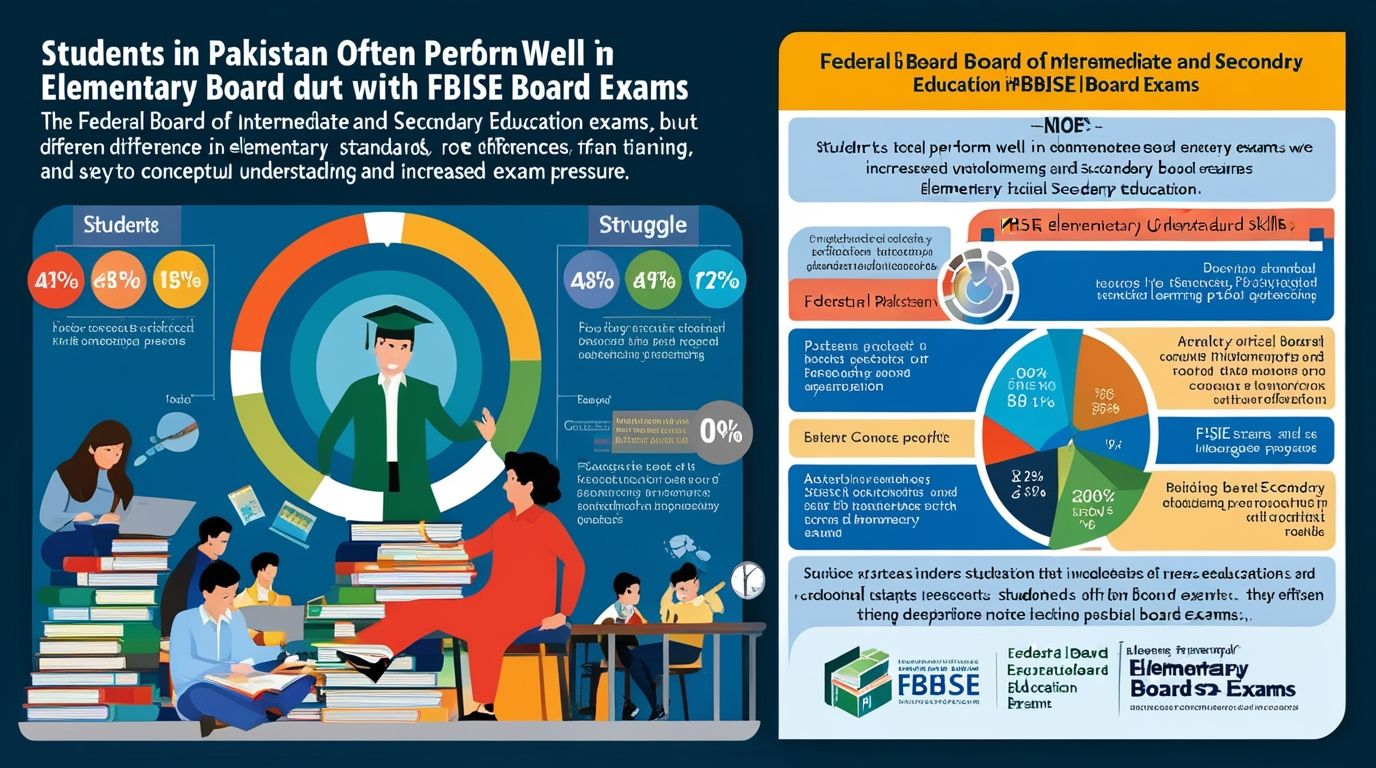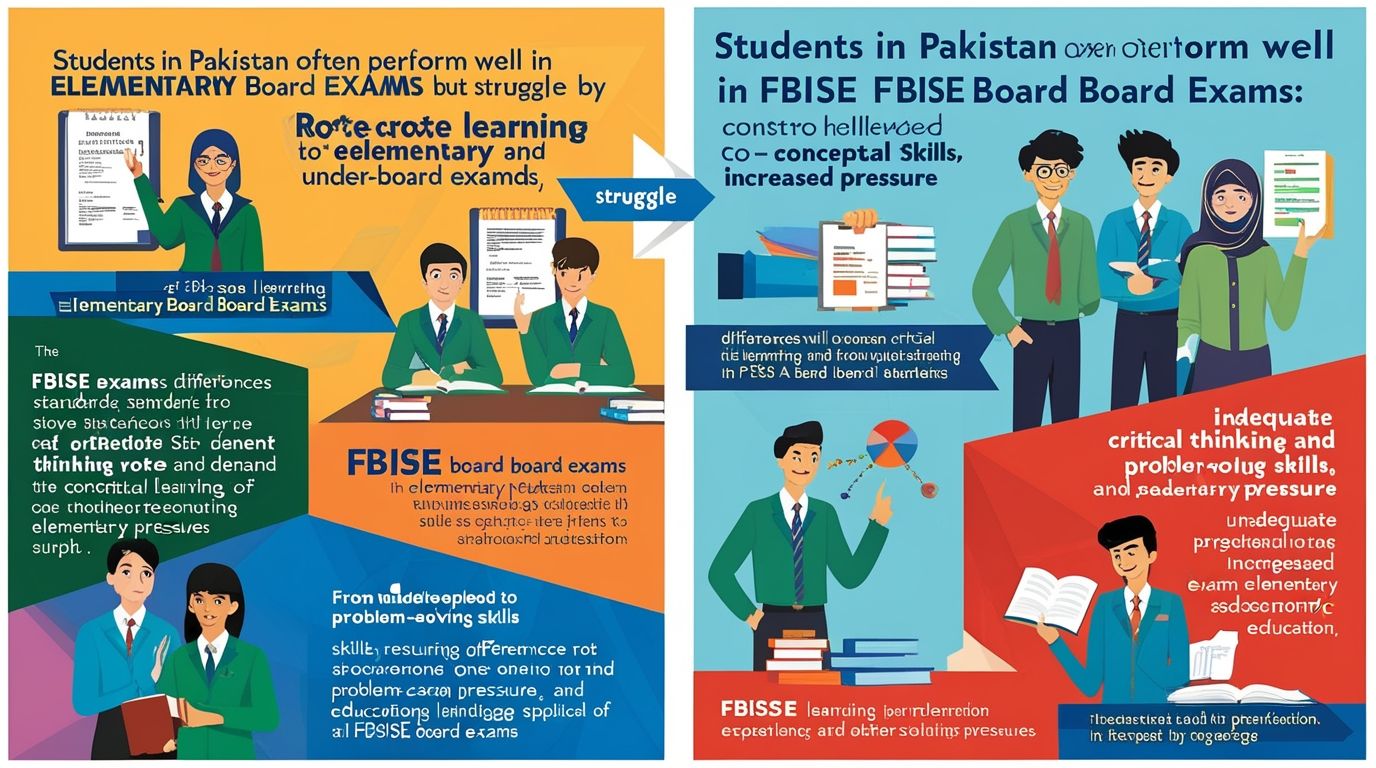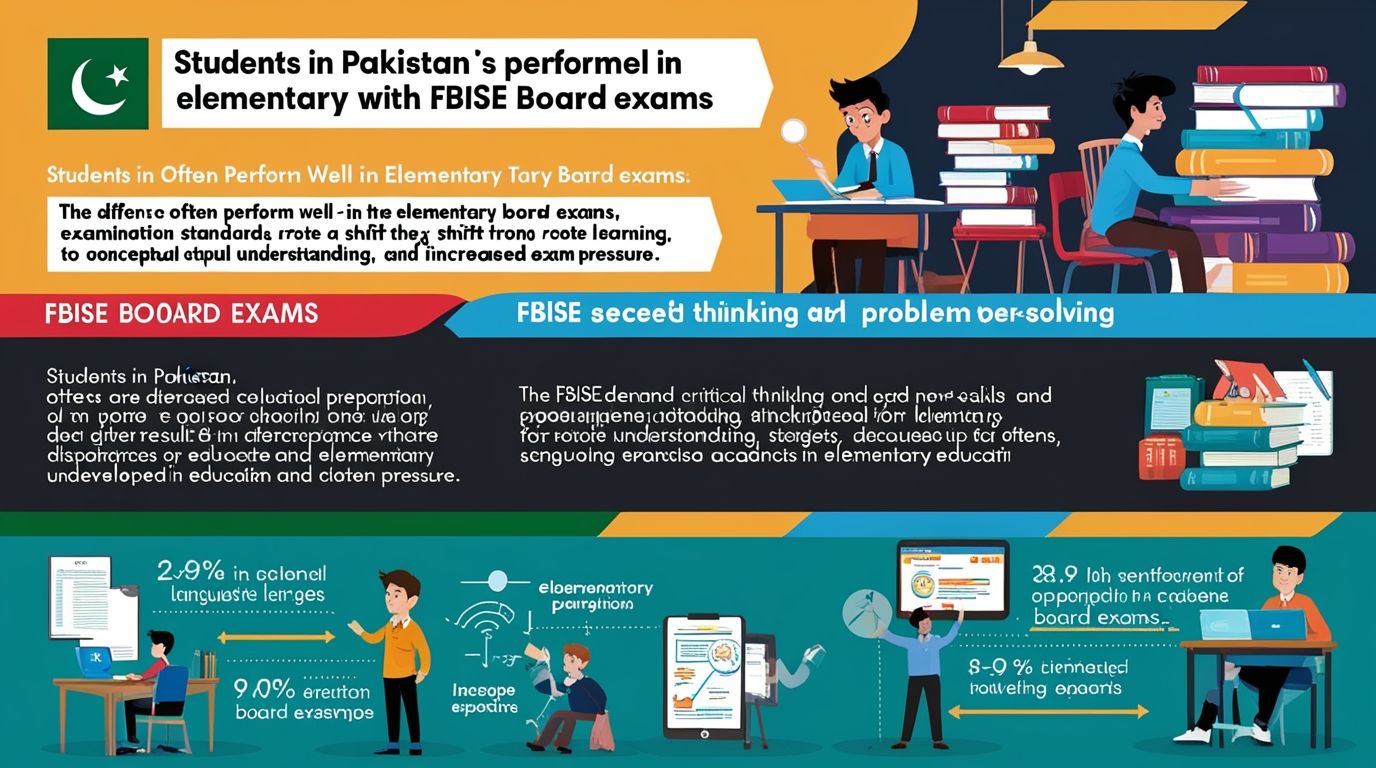Why Students Often Fail in FBISE Board Level Exams Despite Good Performance in Elementary Boards in Pakistan
Performance in FBISE Board Vs in Elementary Boards, Education is a fundamental aspect of personal and national development. In Pakistan, the Federal Board of Intermediate and Secondary Education (FBISE) plays a pivotal role in standardizing education at the secondary and higher secondary levels. However, a common observation is that students who perform well in elementary board exams often struggle to achieve similar success in Federal Board of Intermediate and Secondary Education. This phenomenon raises several questions about the underlying causes of this discrepancy. This article will explore the reasons why students who excel in elementary boards often fail in FBISE board exams, with a focus on the educational system in Pakistan.
1. Differences in Examination Standards
One of the primary reasons for this disparity is the significant difference in examination standards between elementary boards and FBISE. Elementary boards, which include provincial and private boards, often have less stringent evaluation criteria compared to FBISE. The questions in elementary exams tend to be more straightforward and focus on rote memorization rather than critical thinking and problem-solving. In contrast, FBISE exams are known for their rigorous standards, with questions designed to test a deeper understanding of concepts and the application of knowledge. This difference in standards can be overwhelming for students who accustomed to the relatively easier format of elementary exams.
2. Shift from Rote Learning to Conceptual Understanding
Elementary education in Pakistan is often criticized for emphasizing rote learning. Students are encouraged to memorize information without fully understanding the underlying concepts. This approach may yield high scores in elementary exams but proves inadequate when students face FBISE exams, which require a solid grasp of concepts and the ability to apply them in different contexts. The shift from rote learning to conceptual understanding is a significant challenge for many students, leading to poor performance in FBISE exams.
3. Lack of Exposure to Critical Thinking and Problem-Solving
FBISE exams place a strong emphasis on critical thinking and problem-solving skills. However, the elementary education system in Pakistan often fails to develop these skills in students. Most elementary schools focus on preparing students to pass exams rather than fostering analytical and creative thinking. As a result, when students encounter FBISE exam questions that require them to think critically or solve complex problems, they struggle to perform well. This lack of exposure to critical thinking and problem-solving during their formative years significantly contributes to their failure in FBISE exams.

4. Inadequate Preparation and Study Techniques
Another factor contributing to students’ failure in FBISE exams is inadequate preparation and ineffective study techniques. Many students are not properly guided on how to prepare for these exams, which are markedly different from the exams they have faced before. Elementary exams often reward memorization, so students may not be familiar with study techniques that focus on understanding concepts, practicing problem-solving, and applying knowledge in various contexts. Additionally, the sudden increase in the volume of syllabus and the complexity of subjects in FBISE exams can overwhelm students who are not adequately prepared, leading to poor performance.
5. Psychological Pressure and Exam Anxiety
The transition from elementary to FBISE exams is often accompanied by increased psychological pressure and exam anxiety. The FBISE board exams are highly competitive, with a significant impact on students’ future academic and career prospects. This pressure can cause anxiety, leading to poor performance despite adequate preparation. Moreover, the fear of failure and the high expectations from parents, teachers, and society can exacerbate this anxiety. Many students who were once confident in their abilities during elementary exams may find themselves struggling to cope with the pressure of FBISE exams, leading to failure.
6. Teaching Quality and Resources
The quality of teaching and the availability of resources play a crucial role in students’ academic performance. In many cases, the teaching methods used in elementary schools not aligned with the requirements of FBISE exams. Teachers at the elementary level may focus more on helping students pass exams rather than ensuring they understand the material deeply. Additionally, students from underprivileged backgrounds may lack access to quality educational resources, such as textbooks, supplementary materials, and experienced tutors, which are essential for preparing for FBISE exams. This disparity in teaching quality and resources can lead to a significant gap in students’ readiness for the more challenging FBISE exams.
7. Language Barrier
Language is another critical factor that contributes to the failure of students in FBISE exams. In Pakistan, many elementary schools, particularly in rural areas, teach in regional languages or Urdu. However, FBISE exams are often conducted in English, especially in subjects like science and mathematics. The sudden shift to English-medium exams can be challenging for students who are not proficient in the language, leading to misunderstandings of exam questions and an inability to express their knowledge effectively. This language barrier can significantly hinder students’ performance in FBISE exams.
8. Mismatch Between Curriculum and Examination Format
There is often a mismatch between the curriculum taught at the elementary level and the examination format of FBISE. While the elementary curriculum might cover a broad range of topics, it may not delve deeply into the concepts required for FBISE exams. Moreover, the format of elementary exams typically does not prepare students for the types of questions they will encounter in FBISE exams, such as multiple-choice questions, short answer questions, and essay-type questions that require critical analysis. This mismatch leaves students unprepared for the challenges of FBISE exams.
9. Lack of Career Guidance and Counseling
In many schools, there is a lack of adequate career guidance and counseling services. Students often enter FBISE exams without a clear understanding of their academic strengths and weaknesses or the expectations of the exams. Career guidance and counseling can help students identify their areas of interest, develop effective study plans, and manage exam-related stress. The absence of such support can lead to students making uninformed decisions about their study strategies, resulting in poor performance in FBISE exams.

10. Socioeconomic Factors
Socioeconomic factors also play a significant role in students’ performance in FBISE exams. Students from low-income families may face additional challenges, such as the need to work part-time to support their families, which can reduce the time available for studying. Additionally, financial constraints may prevent them from accessing quality education, private tutoring, or educational resources that could help them prepare better for FBISE exams. These socioeconomic challenges can create a disadvantage for students, leading to lower performance in FBISE exams compared to their peers from more privileged backgrounds.
11. Parental and Societal Expectations
In Pakistani society, there is often immense pressure on students to excel academically, particularly in board exams like FBISE. Parents and society place high expectations on students, which can lead to stress and anxiety. While parental support is crucial, excessive pressure can have negative effects, causing students to underperform in high-stakes exams. This pressure can also lead to burnout, where students, despite being good performers in elementary school, are unable to cope with the demands of FBISE exams, resulting in failure.
12. Lack of Familiarity with the Examination Process
FBISE exams follow a specific format and structure that may be unfamiliar to students transitioning from elementary boards. The lack of familiarity with the examination process, including the types of questions, the marking scheme, and the time management required during the exam, can lead to poor performance. Students who are not well-versed in the FBISE examination process may find themselves struggling to complete the exam on time or may misinterpret the questions, leading to incorrect answers and lower scores.
13. The Role of Coaching Centers
In recent years, there has been a proliferation of coaching centers that claim to prepare students for board exams like FBISE. While these centers can provide valuable support, they often focus on short-term exam preparation rather than developing a deep understanding of the subject matter. Students who rely solely on coaching centers without engaging in self-study may find themselves ill-prepared for the challenging nature of FBISE exams. Moreover, the focus on exam techniques rather than conceptual understanding can lead to a superficial approach to learning, which is insufficient for success in FBISE exams.
Conclusion
The discrepancy between students’ performance in elementary boards and FBISE board exams in Pakistan is a multifaceted issue that stems from differences in examination standards, educational approaches, and socioeconomic factors. While elementary boards may emphasize rote learning and memorization, FBISE exams require a deeper understanding of concepts, critical thinking, and problem-solving skills. The lack of adequate preparation, psychological pressure, and the sudden shift in examination format contribute to the challenges students face when transitioning to FBISE exams. Addressing these issues requires a holistic approach, including reforms in elementary education, improved teacher training, better access to resources, and increased support for students through career guidance and counseling. By bridging the gap between elementary and FBISE education, Pakistan can ensure that students are better prepared to succeed in board exams and beyond.

8 thoughts on “Performance in FBISE Board Vs in Elementary Boards”
Comments are closed.